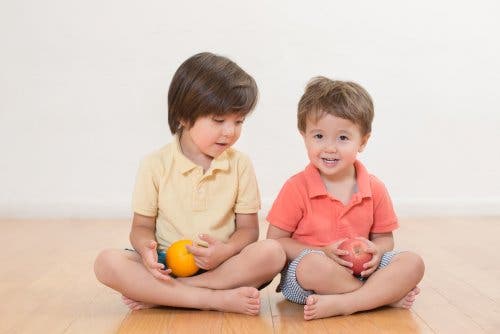How to Foster Good Sibling Relationships

Siblings are a child’s first interaction with peers. With them, they must learn to share and to be tolerant. During this process, it’s common for disputes to occur. However, the attitude parents adopt in this regard can help achieve good sibling relationships.
Our brothers are our first friends, confidants, and life partners. With them, we experiment and shape our limits and social identity. In addition, with them, we learn to share our toys, spaces, and even our parents.
These learning processes aren’t easy. It takes time to develop empathy, tolerance, and cooperative skills. And precisely our siblings are in charge of accompanying us on this adventure. Therefore, it isn’t surprising for difficulties to arise in the process.
Prevention is the key to good sibling relationships
If you want to foster good sibling relationships, remember that the task begins before your second child arrives. You must prepare your first-born to abandon their role as an only child. If you don’t help them in the transition, jealousy and rivalry may arise.

To avoid this situation, you have to involve the older sibling in the entire process of welcoming a new family member. You have to explain what’s going to happen and share with them the excitement of imagining what the new sibling will be like and all the things they can do together.
Once your second child is born, you must strive to integrate the older sibling into the new family dynamic. You can ask them to help you by bringing you a diaper, choosing clothes for their sibling, or singing them to sleep.
Keys to fostering good sibling relationships
Be a role model
When it comes to raising a child, your actions are more valuable than your words. If you want your children to build good relationships with each other, you must be a role model. If you tend to raise your voice or lose your temper, you can’t blame your children for doing so. Thus, remember that you must try to be respectful and understanding with others.
The way you talk and act with your own siblings is also important. If your children see you relate to them in an affectionate and friendly way, they’ll internalize that model. In addition, it’s also a good idea to tell them stories from your childhood in which you shared complicity and support with your siblings.
Avoid comparisons and distinctions
You must accept and appreciate your children as they are. Every child has the right to develop their own personality and to be loved for who they are. Therefore, we advise against making comparisons between siblings.
It’s unpleasant and discouraging to feel that your parents don’t value you for who you are and compare you to your siblings. Therefore, try to independently praise each of your children’s particular virtues.
On the other hand, it’s important not to make distinctions regarding the time and attention you dedicate to each child. It’s true that some children are more demanding than others, and that, at certain vital moments, one of them will need more of you than their siblings.

However, it’s important that you don’t forget that your independent child, the one who doesn’t give you any problems, also needs your attention and your time, and that you must give it to them in the same way as you do to the rest of your children.
Mediate without imposing
When there’s a conflict between your children, it’s easy to fall into the role of judge and impose the solution to their problem. However, it’s much more useful for you to guide them so they can solve it on their own. It’s important that you teach them to have a conversation, respect their turn to speak, and listen to each other. You also need to teach them to negotiate, cooperate, and reach agreements.
Share experiences
The best way to establish an emotional bond between siblings is by sharing experiences. Try to find moments and activities that your children can share. Play board games as a family and encourage them to do their household chores or homework together to make it more enjoyable for them.
If your children agree, sharing a room is a good way to experience moments of complicity and confidence that will undoubtedly strengthen their fraternal ties.
Siblings are a child’s first interaction with peers. With them, they must learn to share and to be tolerant. During this process, it’s common for disputes to occur. However, the attitude parents adopt in this regard can help achieve good sibling relationships.
Our brothers are our first friends, confidants, and life partners. With them, we experiment and shape our limits and social identity. In addition, with them, we learn to share our toys, spaces, and even our parents.
These learning processes aren’t easy. It takes time to develop empathy, tolerance, and cooperative skills. And precisely our siblings are in charge of accompanying us on this adventure. Therefore, it isn’t surprising for difficulties to arise in the process.
Prevention is the key to good sibling relationships
If you want to foster good sibling relationships, remember that the task begins before your second child arrives. You must prepare your first-born to abandon their role as an only child. If you don’t help them in the transition, jealousy and rivalry may arise.

To avoid this situation, you have to involve the older sibling in the entire process of welcoming a new family member. You have to explain what’s going to happen and share with them the excitement of imagining what the new sibling will be like and all the things they can do together.
Once your second child is born, you must strive to integrate the older sibling into the new family dynamic. You can ask them to help you by bringing you a diaper, choosing clothes for their sibling, or singing them to sleep.
Keys to fostering good sibling relationships
Be a role model
When it comes to raising a child, your actions are more valuable than your words. If you want your children to build good relationships with each other, you must be a role model. If you tend to raise your voice or lose your temper, you can’t blame your children for doing so. Thus, remember that you must try to be respectful and understanding with others.
The way you talk and act with your own siblings is also important. If your children see you relate to them in an affectionate and friendly way, they’ll internalize that model. In addition, it’s also a good idea to tell them stories from your childhood in which you shared complicity and support with your siblings.
Avoid comparisons and distinctions
You must accept and appreciate your children as they are. Every child has the right to develop their own personality and to be loved for who they are. Therefore, we advise against making comparisons between siblings.
It’s unpleasant and discouraging to feel that your parents don’t value you for who you are and compare you to your siblings. Therefore, try to independently praise each of your children’s particular virtues.
On the other hand, it’s important not to make distinctions regarding the time and attention you dedicate to each child. It’s true that some children are more demanding than others, and that, at certain vital moments, one of them will need more of you than their siblings.

However, it’s important that you don’t forget that your independent child, the one who doesn’t give you any problems, also needs your attention and your time, and that you must give it to them in the same way as you do to the rest of your children.
Mediate without imposing
When there’s a conflict between your children, it’s easy to fall into the role of judge and impose the solution to their problem. However, it’s much more useful for you to guide them so they can solve it on their own. It’s important that you teach them to have a conversation, respect their turn to speak, and listen to each other. You also need to teach them to negotiate, cooperate, and reach agreements.
Share experiences
The best way to establish an emotional bond between siblings is by sharing experiences. Try to find moments and activities that your children can share. Play board games as a family and encourage them to do their household chores or homework together to make it more enjoyable for them.
If your children agree, sharing a room is a good way to experience moments of complicity and confidence that will undoubtedly strengthen their fraternal ties.
All cited sources were thoroughly reviewed by our team to ensure their quality, reliability, currency, and validity. The bibliography of this article was considered reliable and of academic or scientific accuracy.
- Pérez, A. R. (2007). Principales modelos de socialización familiar. Foro de educación, 5(9), 91-97.
- Umaña Segura, L. A. (2019, julio). Empatía, la difícil y enriquecedora tarea de ponernos en los zapatos de los demás. Recuperado de https://lamenteesmaravillosa.com/empatia-la-dificil-y-enriquecedora-tarea-de-ponernos-en-los-zapatos-de-los-demas/
This text is provided for informational purposes only and does not replace consultation with a professional. If in doubt, consult your specialist.








